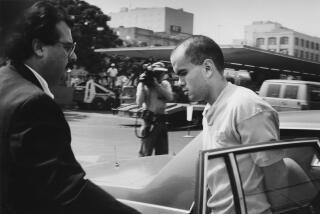Character Assassins Strike Again : It’s easy to ruin the image of a public servant like Adm. Boorda; today’s lynch mobs use the media to do the job.
- Share via
The funeral is over. Another good man has taken a gun and ended his life. Washington records another suicide. For the media, the story fades, but the rest of us need to understand why Adm. Jeremy Michael Boorda, a decent, hard-working man, would rather end his life than face the press and his political enemies.
If you have never experienced life under a microscope, it is almost impossible to understand any of this. Those who live a public life are no longer seen as human beings. Rather, they are objects to be examined, worked over, manipulated, ridiculed and sometimes even hated. Someone else defines who they are as men and women and what they stand for as public figures. And that image often has little to do with the real person.
The press is merely the medium through which this picture is painted. And in this impersonal society, the press is the vehicle through which we interact. People who have the power or the ability to manipulate what is written about a public person have enormous power.
I dare say it was not questions about two ribbons once on his chest that caused Boorda’s suicide. The story is a much larger one. It probably involves men who disagreed with the direction he was taking the Navy. His work to clean up the Naval Academy, the Tailhook scandal and other problems probably made some mean enemies for the admiral. And these enemies knew that the way to destroy his effectiveness was to destroy his public image.
In the early days of this country, people who violated norms of the society were put in public stocks, jeered by crowds and assaulted with any handy objects. Then it was possible for an individual to retreat from such humiliation and retain some dignity, to continue to live in this word.
Today, where image is everything in public life, there is a much more deadly blood sport. A new type of lynch mob uses the press to accomplish its goals. No longer does our political process discuss philosophy and issues. Rather, personality and celebrity are paramount.
The personal lives of our public figures are scrutinized in the hope of finding some flaw, some misstep, some instance that can be blown up out of proportion, to make or break those individuals. Then their ideas and programs can be killed without any real public discussion.
The real culprits are the people who anonymously feed this venom to the press for the purpose of gaining political power.
To survive this blood sport of media lynching, individuals who are public figures must be so ambitious, so eager for power and the prestige that goes along with it that they are able to set aside their own humanity and feelings. And they, in turn, commit the same deed on those who frustrate or stand in their way. No wonder we are personally repulsed and cynical about public life and those who inhabit it.
We could learn a lesson from the Indians of Ecuador, who refuse to be photographed. A picture can rob them of their souls, they explain. Isn’t that what anonymous sources and the media do regularly to those unfortunate souls who find themselves in the public limelight--rob them of their good character, their souls? Murdering a person’s image is an ugly, reprehensible act. Suicides of good people can be the result.


